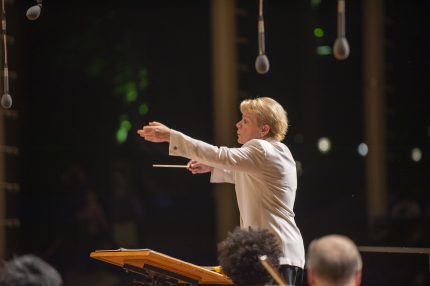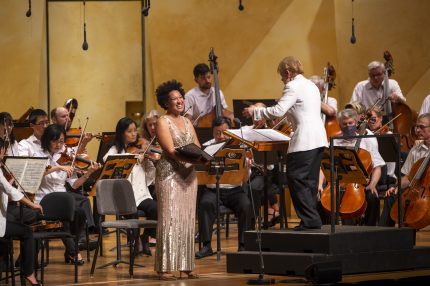Mixed midsummer Mahler from Alsop and CSO at Ravinia

Live orchestra concerts have returned this waning Covid-19 summer and the music of Mozart, Beethoven and Brahms is filling outdoor venues once again.
Thursday night’s program at Ravinia gives an indication of how quickly things have normalized over recent weeks. When originally announced, Marin Alsop was to have conducted the Chicago Symphony Orchestra in Mahler’s Symphony No. 4–that is, Klaus Simon’s 2007 chamber reduction, in order to adhere to spring restrictions limiting the number of musicians onstage.
Yet Thursday night, Alsop and the CSO gave us the Full Gustav—Mahler’s Fourth with its original large orchestral resources and every note intact as scored.
That should have been a cause for celebration. There was much inspired playing that demonstrates that the CSO remains a top Mahler band—even with less-frequent Mahler performances over the tenure of Riccardo Muti, who has stated his lack of sympathy for the Austrian composer’s music. (Let’s hope that Mahler returns to a more prominent place at Orchestra Hall in the not-too-distant future.)
Yet sadly, even with some fine playing, Thursday’s CSO performance of Mahler’s intimate Fourth was a great disappointment, and one that starkly highlighted the limitations of Ravinia’s current chief conductor in this repertoire.
From the opening bars where the antic sleigh bells were nearly inaudible, Alsop led a superficial canter through Mahler’s score. In the long opening movement, she repeatedly ignored or sloughed over Mahler’s scrupulous dynamic and expressive markings with tempos that seemed to have little relation to each other. The bucolic charm and darker existential moments were diluted and blurred together into a generalized architecture. Textures were unrefined, key string solos got buried, and tuttis were loud and raucous with balances left to sort themselves out. Call it the Dummy’s Guide to Mahler 4.
The hapless quality continued in the second movement. Stephanie Jeong’s devilish down-tuned violin was under-projected yet the associate concertmaster got no help from Alsop with the conductor letting bumptious secondary lines swamp her solos. Alsop’s inability to balance Mahler’s hectic passages led to some bizarre moments, sounding at times like we had segued into a strange and newly unearthed Mahler horn concerto. (Superb playing by principal David Cooper provided some respite amid the over-dominant brass.)
The lyrical third movement is more straightforward and so went better with refined and warmly burnished string playing across all sections.

Making her Ravinia and CSO debuts, Julia Bullock was the soloist in the vocal finale. Even in Mahler performances more idiomatic and successful than this, this solo rarely comes off as the composer intended and so it proved again.
This was likely not Bullock’s fault. The issue seemed either a technical lapse or spacing issue with the soprano perhaps initially standing too far from her mic. Whatever the case, in the pavilion she sounded unamplified, her voice emerging distant and echoey. The latter stanzas sounded a bit better sonically but it’s unfortunate this gifted artist was so ill served in her Ravinia debut.
Even with the sonic issue, Bullock still managed to communicate the essence of the child’s view of heaven text (even if she relied on her winning smile a bit too much). Bullock possesses a pure, youthful soprano ideal for this music and sang with winsome charm of heaven’s feasts, brought apt unease to the darker stanza, and floated the right sense of consolatory contentment in the hushed final section (mercifully allowed to fade into silence unbroken by premature applause). Let’s hope some enterprising presenter invites Bullock back for a full-length recital.
The evening led off with Prokofiev’s short-program-friendly “Classical” Symphony (No. 1). Alsop led a beefy reading that stinted on the charm and rococo refinement, with winds unblended and unkempt tuttis.
Marin Alsop conducts the Chicago Symphony Orchestra 8 p.m. Friday at Ravinia. The concert includes Haydn’s Symphony No. 60 “Il distratto,” Brahms’ Variations on a Theme by Haydn and Copland’s Clarinet Concerto with Anthony McGill as soloist. ravinia.org
Posted in Uncategorized





Posted Jul 25, 2021 at 8:27 am by Brian McCarty
I’m pleased to see Lawrence Johnson calling out the clear source of this strikingly poor Mahler performance. Maestro Marin Alsop is apt with much of the traditional Mozart/Hayden/Brahms catalog. She is, however, clearly incapable of the nuance and depth of understanding that Gustav Mahler demands of a conductor, the musicians, and the audience.
Mahler 4 is one of the most straightforward of the Mahler symphonies. For Alsop to have butchered it so thoroughly should be a warning to those pushing her to a more expansive role with the CSO.
She belongs in a third-tier orchestra like at Baltimore. She’s out of her depth in Chicago.